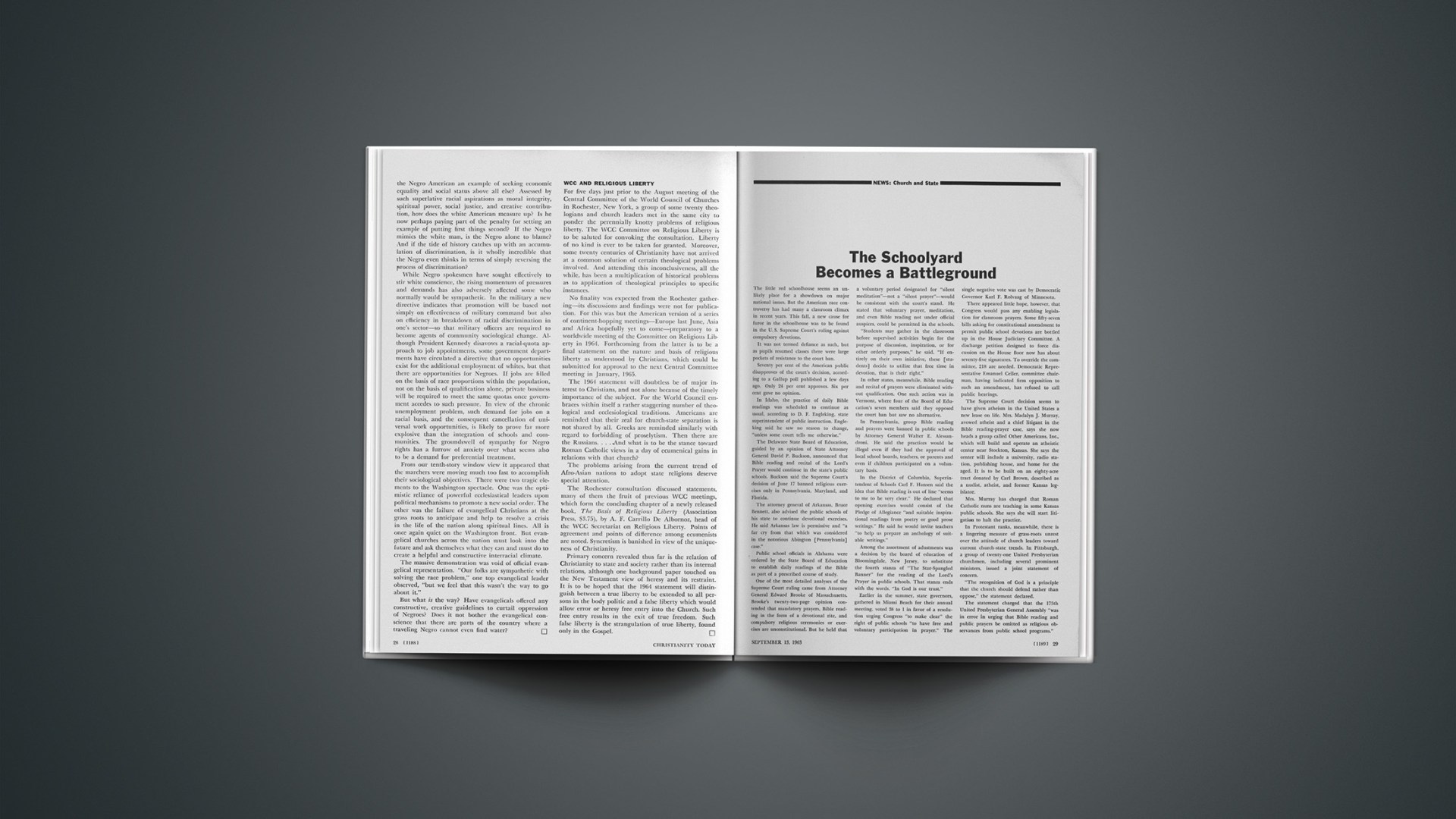The little red schoolhouse seems an unlikely place for a showdown on major national issues. But the American race controversy has had many a classroom climax in recent years. This fall, a new cause for furor in the schoolhouse was to be found in the U. S. Supreme Court’s ruling against compulsory devotions.
It was not termed defiance as such, but as pupils resumed classes there were large pockets of resistance to the court ban.
Seventy per cent of the American public disapproves of the court’s decision, according to a Gallup poll published a few days ago. Only 24 per cent approves. Six per cent gave no opinion.
In Idaho, the practice of daily Bible readings was scheduled to continue as usual, according to D. F. Engleking, state superintendent of public instruction. Engleking said he saw no reason to change, “unless some court tells me otherwise.”
The Delaware State Board of Education, guided by an opinion of State Attorney General David P. Buckson, announced that Bible reading and recital of the Lord’s Prayer would continue in the state’s public schools. Buckson said the Supreme Court’s decision of June 17 banned religious exercises only in Pennsylvania, Maryland, and Florida.
The attorney general of Arkansas, Bruce Bennett, also advised the public schools of his state to continue devotional exercises. He said Arkansas law is permissive and “a far cry from that which was considered in the notorious Abington [Pennsylvania] case.”
Public school officials in Alabama were ordered by the State Board of Education to establish daily readings of the Bible as part of a prescribed course of study.
One of the most detailed analyses of the Supreme Court ruling came from Attorney General Edward Brooke of Massachusetts. Brooke’s twenty-two-page opinion contended that mandatory prayers, Bible reading in the form of a devotional rite, and compulsory religious ceremonies or exercises are unconstitutional. But he held that a voluntary period designated for “silent meditation”—not a “silent prayer”—would be consistent with the court’s stand. He stated that voluntary prayer, meditation, and even Bible reading not under official auspices, could be permitted in the schools.
“Students may gather in the classroom before supervised activities begin for the purpose of discussion, inspiration, or for other orderly purposes,” he said. “If entirely on their own initiative, these [students] decide to utilize that free time in devotion, that is their right.”
In other states, meanwhile, Bible reading and recital of prayers were eliminated without qualification. One such action was in Vermont, where four of the Board of Education’s seven members said they opposed the court ban but saw no alternative.
In Pennsylvania, group Bible reading and prayers were banned in public schools by Attorney General Walter E. Alessandroni. He said the practices would be illegal even if they had the approval of local school boards, teachers, or parents and even if children participated on a voluntary basis.
In the District of Columbia, Superintendent of Schools Carl F. Hansen said the idea that Bible reading is out of line “seems to me to be very clear.” He declared that opening exercises would consist of the Pledge of Allegiance “and suitable inspirational readings from poetry or good prose writings.” He said he would invite teachers “to help us prepare an anthology of suitable writings.”
Among the assortment of adustments was a decision by the board of education of Bloomingdale, New Jersey, to substitute the fourth stanza of “The Star-Spangled Banner” for the reading of the Lord’s Prayer in public schools. That stanza ends with the words, “In God is our trust.”
Earlier in the summer, state governors, gathered in Miami Beach for their annual meeting, voted 38 to 1 in favor of a resolution urging Congress “to make clear” the right of public schools “to have free and voluntary participation in prayer.” The single negative vote was cast by Democratic Governor Karl F. Rolvaag of Minnesota.
There appeared little hope, however, that Congress would pass any enabling legislation for classroom prayers. Some fifty-seven bills asking for constitutional amendment to permit public school devotions are bottled up in the House Judiciary Committee. A discharge petition designed to force discussion on the House floor now has about seventy-five signatures. To override the committee, 218 are needed. Democratic Representative Emanuel Celler, committee chairman, having indicated firm opposition to such an amendment, has refused to call public hearings.
The Supreme Court decision seems to have given atheism in the United States a new lease on life. Mrs. Madalyn J. Murray, avowed atheist and a chief litigant in the Bible reading-prayer case, says she now heads a group called Other Americans, Inc., which will build and operate an atheistic center near Stockton, Kansas. She says the center will include a university, radio station, publishing house, and home for the aged. It is to be built on an eighty-acre tract donated by Carl Brown, described as a nudist, atheist, and former Kansas legislator.
Mrs. Murray has charged that Roman Catholic nuns are teaching in some Kansas public schools. She says she will start litigation to halt the practice.
In Protestant ranks, meanwhile, there is a lingering measure of grass-roots unrest over the attitude of church leaders toward current church-state trends. In Pittsburgh, a group of twenty-one United Presbyterian churchmen, including several prominent ministers, issued a joint statement of concern.
“The recognition of God is a principle that the church should defend rather than oppose,” the statement declared.
The statement charged that the 175th United Presbyterian General Assembly “was in error in urging that Bible reading and public prayers be omitted as religious observances from public school programs.”










